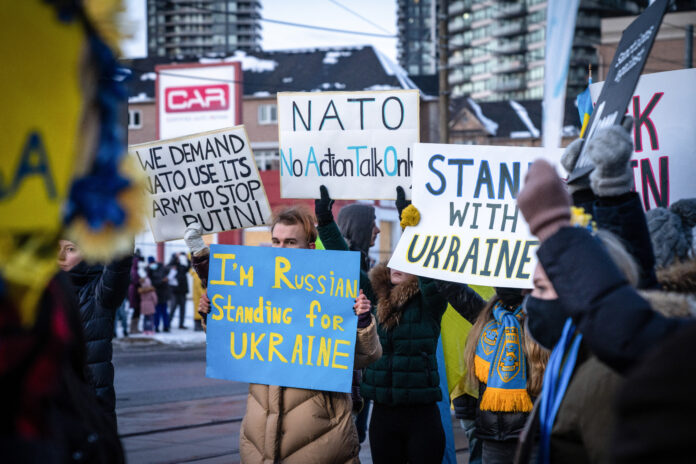The United States, European Union, Canada and United Kingdom on Saturday agreed to block “selected’ Russian banks from the SWIFT global financial messaging system and to impose ”restrictive measures” on its central bank in retaliation for its invasion of Ukraine.
The measures were announced jointly as part of a new round of financial sanctions meant to “hold Russia to account and collectively ensure that this war is a strategic failure for (Russian President Vladimir) Putin.” The central bank sanctions restrictions target $600 billion in reserves that the Kremlin has at its disposal.
Saturday’s move includes cutting key Russian banks out of the SWIFT financial system, which daily moves countless billions of dollars around more than 11,000 banks and other financial institutions around the world.
Allies on both sides of the Atlantic also considered the SWIFT option in 2014, when Russia invaded and annexed Ukraine’s Crimea and backed separatist forces in eastern Ukraine. Russia declared then that kicking it out of SWIFT would be equivalent to a declaration of war. The allies — criticized ever after for responding too weakly to Russia’s 2014 aggression — shelved the idea. Russia since then has tried to develop its own financial transfer system, with limited success.
The U.S. has succeeded before in persuading the Belgium-based SWIFT system to kick out a country — Iran, over its nuclear program. But kicking Russia out of SWIFT would also hurt other economies, including those of the U.S. and key ally Germany.
World waits for Russia’s next moves as invasion intensifies
The disconnection from SWIFT announced by the West on Saturday is partial, leaving Europe and the United States room to escalate penalties further later.
Trending Stories
War in Ukraine: Hit to semiconductor supply could hike prices in Canada
Alberta to end most remaining COVID-19 restrictions on March 1
Announcing the measures in Brussels, EU Commission President Ursula von der Leyen said would push the bloc also to “paralyze the assets of Russia’s Central bank” so that its transactions would be frozen. Cutting several commercial banks from SWIFT “will ensure that these banks are disconnected from the international financial system and harm their ability to operate globally,” she added.
“Cutting banks off will stop them from conducting most of their financial transactions worldwide and effectively block Russian exports and imports,” she added.
Getting the EU on board for sanctioning Russia through SWIFT had been a tough process since EU trade with Russia amounted to 80 billion euros, about 10 times as much as the United States, which had been an early proponent of such measures.
Canada to place sanctions on Putin for Russian invasion of Ukraine
Germany specifically had balked at the measure since it could hit them hard. But Foreign Minister Annalena Baerbock said in a statement that “after Russia’s shameless attack … we are working hard on limiting the collateral damage of decoupling (Russia) from SWIFT so that it hits the right people. What we need is a targeted, functional restrictions of SWIFT.”
As another measure, the allies announced a commitment “to taking measures to limit the sale of citizenship — so-called golden passports — that let wealthy Russians connected to the Russian government become citizens of our countries and gain access to our financial systems.”
The group also announced the formation this week of a transatlantic task force to ensure that these and other sanctions on Russia are implemented effectively through information sharing and asset freezes.
Rachel Ziemba, an adjunct senior fellow at the Center for a New American Security said despite a complete SWIFT ban, “these measures will still be painful to Russia’s economy. They reinforce the measures already taken earlier this week by making transactions more complicated and difficult.”
Ziemba says how much pain the sanctions render on the Russian economy will depend on which banks have been restricted and which measures are taken to restrict the ability of the Central Bank to operate.
“Regardless, these sort of escalating sanctions, removing banks from SWIFT, restricting the Central Bank, this will all make it more difficult to get commodities from Russia and will increase the pressure on the financial market.”
___
Casert reported from Brussels. Associated Press writers Frank Jordan, Ellen Knickmeyer and Fatima Hussein contributed to this report.
© 2022 The Canadian Press



